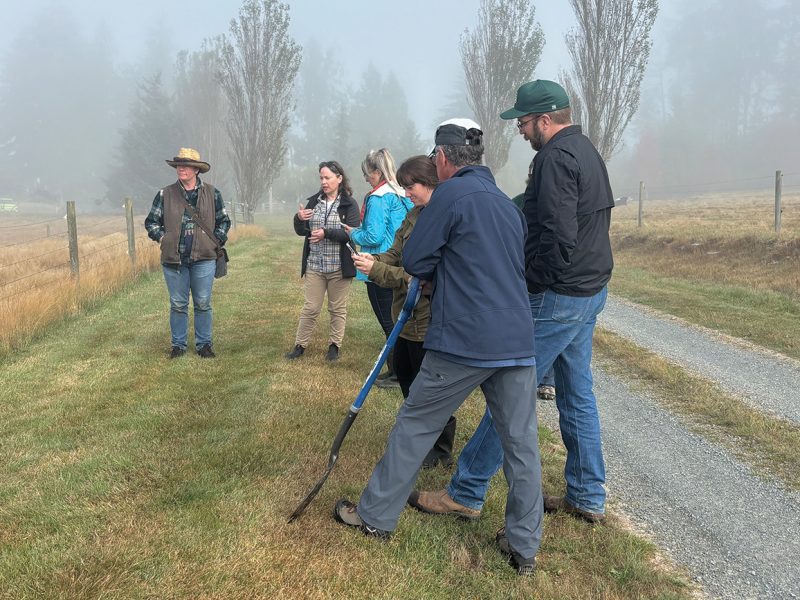METCHOSIN – Over 20 South Vancouver Island producers attended the livestock drought management field day held at Brass Bell Farm in East Sooke and Parry Bay Farm in Metchosin on September 12. The sessions were facilitated by North Okanagan farmers and professional agrologists Greg Tegart and Mike Witt.
The day started at Brass Bell Farm where owner Amber Rowse-Robinson gave attendees a tour of her 108 leased acres where she raises heritage sheep, pigs, broilers and cows using regenerative practices. She and her family have been on the property full-time for two years and over the last year Rowse-Robinson has put in a concerted effort to restore neglected pastures to provide quality feed for her livestock.
Brass Bell Farm is undergoing pasture rejuvenation due to such challenges as compaction, creeping red fescue, thistles and low soil pH, which limit the growing season and forage quality.
To raise soil pH, Tegart and Witt proposed applying lime and increasing soil organic matter.
“Try to build organic matter through various practices with your livestock feeding program or you can acquire it via compost if you’re able to use compost,” Tegart says. “The beauty of adding organic matter is that it acts as another buffer against the pH and provides nutrition along the way to feed soil microbes.”
To kickstart the pastures back into a productive state with minimal equipment, the agrologists suggested Rowse-Robinson use her pigs to disturb the soil before broadcasting an annual grass seed mix while keeping an eye on animal performance and health. This is consistent with regenerative concepts that recommend managing grazing to maintain a photosynthetic area that feed the soil microbiology.
“Doing that with a broad species of plants means you’ll have different root depths, different growth periods and you go longer through the season with more diversity,” Tegart says.
Fighting invasive weeds
At Metchosin’s Parry Bay Farm, John and Lorraine Buchanan run about 240 sheep and have been dealing with such invasive weeds as wireweed, creeping red fescue and spear grass in their hay fields and pastures. These species thrive in droughty summers and wet winters, conditions common on southern Vancouver Island.
One attempt to clean out a pasture was to grow barley, which the couple harvested, and they will plant cover crops for fall grazing.
High grazing pressure can help manage problematic weeds as long as animals are able to maintain conditioning, Tegart says.
When the group arrived at Buchanan’s irrigated and thriving annual grass pasture where sheep were grazing, Tegart highlighted frequency, intensity and rest as the three main components that contribute to forage regrowth.
“You can lose tillers off those plants with pressure, whether it’s grazing, weather, haying,” Tegart says. “You’re managing those individual tillers and the growing points within them.”
Each plant has a specific rest period after which, in good growing conditions, the plant will have enough vegetative material that it is no longer using stored energy to initiate growth and has enough photosynthetic area to support above and below-ground growth.
If tillers get chewed off again within that crucial rest period, the plant must use stored energy for vegetative growth, which will result in no root growth and a weakened stand if that continues with long-term grazing, Tegart says.
When producers remove 80% to 90% of physical biomass with haying, for example, root growth may stop for at least two weeks, Tegart adds. If producers grazed this same field, regrowth would happen much more readily because root growth decline is not as dramatic, and tillers don’t need as much stored energy to re-grow.
Management intensive grazing allows farmers to reduce stress on individual species. In addition, a forage mixture of grasses and legumes offers a longer season of palatable and nutritional vegetative matter due to the species’ differing emergence timing, growth point locations, and protein and starch contents.
Also in his presentation, Tegart recommends that producers who buy hay regularly request feed tests and ask about harvest timing, species composition and storage methods to ensure it meets nutritional requirements.
While the field day offered general recommendations, Tegart urged producers to contact their local extension coordinators or agrologists for tailored strategies that fit their specific goals.
Tegart and Witt also facilitated field days that same week at Courtenay’s Hillcrest Farm and Cowichan’s Keating Farm and Promise Valley Farm. These events were brought to producers by the BC Ministry of Agriculture and Food in partnership with the BC Cattlemen’s Association. The ministry’s Livestock Drought Management Guide and workbook will be available online this fall.


 Bird flu returns
Bird flu returns